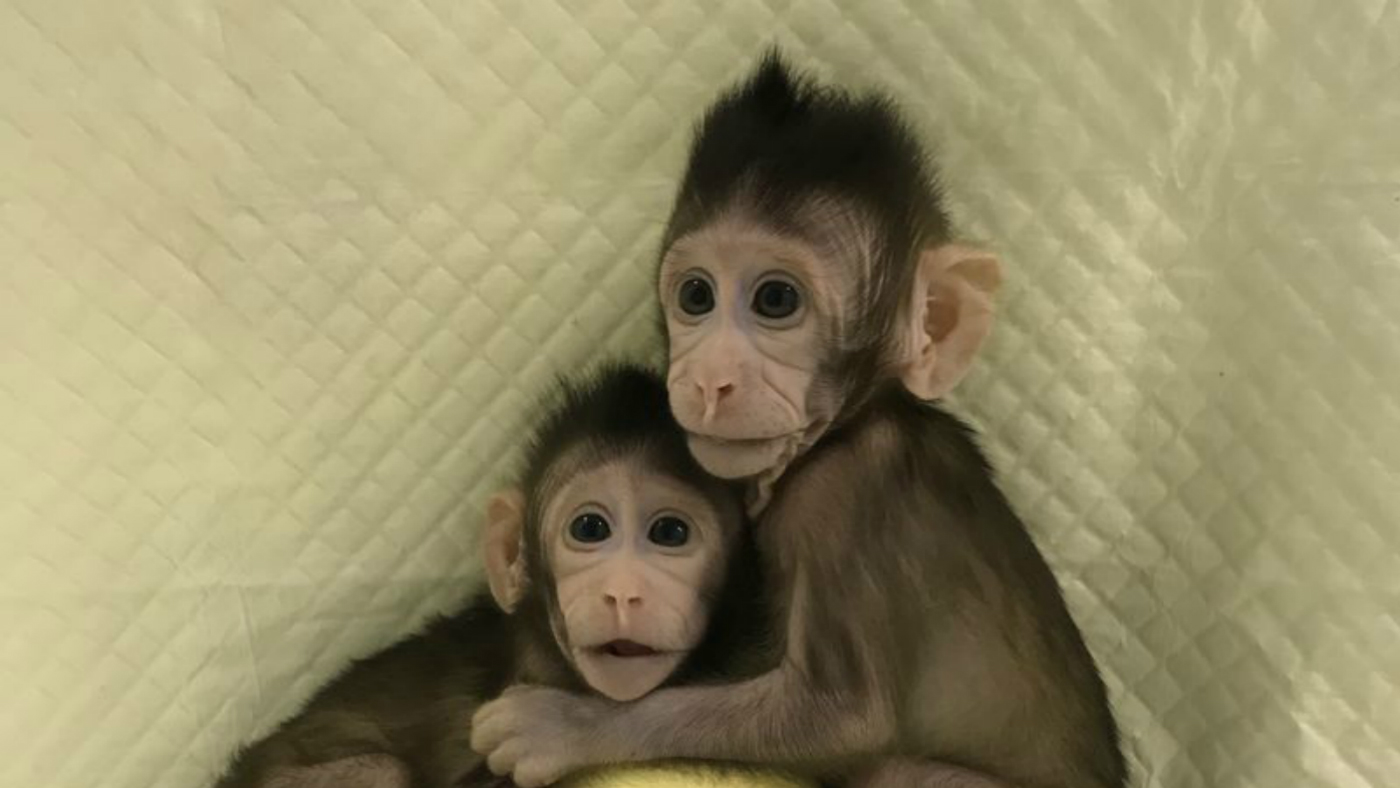Cloning monkeys: the ethical dilemma behind the miracle
Identical macaques Zhong Zhong and Hua Hua were born eight and six weeks ago in Chinese lab

A free daily email with the biggest news stories of the day – and the best features from TheWeek.com
You are now subscribed
Your newsletter sign-up was successful
Chinese researchers have cloned two monkeys using the same method that birthed Dolly the sheep - a technique that raises moral and ethical questions about the possibility of cloning humans.
Chinese researchers employed the somatic cell nuclear transfer (SCNT) technique to create two identical long-tailed macaques, who have been called Zhong Zhong and Hua Hua, born eight and six weeks ago respectively, according to the journal Cell. Since Dolly was created in an Edinburgh lab in 1996, scientists have cloned almost two dozen kinds of mammals, including dogs and cats using this method - and have also created human embryos.
The Chinese team, from the Chinese Academy of Sciences Institute of Neuroscience, in Shanghai, hope to produce genetically uniform animals to research human diseases.
The Week
Escape your echo chamber. Get the facts behind the news, plus analysis from multiple perspectives.

Sign up for The Week's Free Newsletters
From our morning news briefing to a weekly Good News Newsletter, get the best of The Week delivered directly to your inbox.
From our morning news briefing to a weekly Good News Newsletter, get the best of The Week delivered directly to your inbox.
But some critics “view it as a major step towards the creation of tailor-made humans”, Sky News reports. They warn that the possibility of cloning humans comes with its own set of complex set of ethical, moral and legal dilemmas.
Chinese researchers have tried, but so far failed, to produce healthy babies from adult cells. Michigan State University scientist Jose Cibelli told US media that continued attempts could be considered “criminal”, because the number of failed pregnancies would cause pain and potential medical problems for surrogates.
However, as the procedure becomes more efficient, society could face other ethical dilemmas.
Marcy Darnovsky, of California’s Center for Genetics and Society, told the Associated Press (AP) that it would be unethical to subject a cloned child to “the psychological and emotional risks of living under the shadow of its genetic predecessor”, reports The New York Times.
A free daily email with the biggest news stories of the day – and the best features from TheWeek.com
But supporters insist there may be benefits to cloning humans.
The strongest argument would be to allow grieving parents to produce a genetic duplicate of a dead child, Henry Greely, a Stanford University law professor, told AP. Greely doubts whether that would be reason enough to get the procedure approved, however, at least for “decades and decades”.
The cloning of the two macaques has not only triggered a debate about human cloning, but has also reignited the debate about animal cruelty.
“Cloning is a horror show: a waste of lives, time and money - and the suffering that such experiments cause is unimaginable,” said Kathy Guillermo, senior vice president of animal rights group Peta, in a statement yesterday. “Because cloning has a failure rate of at least 90%, these two monkeys represent misery and death on an enormous scale.”
-
 Political cartoons for February 16
Political cartoons for February 16Cartoons Monday’s political cartoons include President's Day, a valentine from the Epstein files, and more
-
 Regent Hong Kong: a tranquil haven with a prime waterfront spot
Regent Hong Kong: a tranquil haven with a prime waterfront spotThe Week Recommends The trendy hotel recently underwent an extensive two-year revamp
-
 The problem with diagnosing profound autism
The problem with diagnosing profound autismThe Explainer Experts are reconsidering the idea of autism as a spectrum, which could impact diagnoses and policy making for the condition
-
 Epstein files topple law CEO, roil UK government
Epstein files topple law CEO, roil UK governmentSpeed Read Peter Mandelson, Britain’s former ambassador to the US, is caught up in the scandal
-
 Iran and US prepare to meet after skirmishes
Iran and US prepare to meet after skirmishesSpeed Read The incident comes amid heightened tensions in the Middle East
-
 Israel retrieves final hostage’s body from Gaza
Israel retrieves final hostage’s body from GazaSpeed Read The 24-year-old police officer was killed during the initial Hamas attack
-
 China’s Xi targets top general in growing purge
China’s Xi targets top general in growing purgeSpeed Read Zhang Youxia is being investigated over ‘grave violations’ of the law
-
 Panama and Canada are negotiating over a crucial copper mine
Panama and Canada are negotiating over a crucial copper mineIn the Spotlight Panama is set to make a final decision on the mine this summer
-
 Why Greenland’s natural resources are nearly impossible to mine
Why Greenland’s natural resources are nearly impossible to mineThe Explainer The country’s natural landscape makes the task extremely difficult
-
 Iran cuts internet as protests escalate
Iran cuts internet as protests escalateSpeed Reada Government buildings across the country have been set on fire
-
 US nabs ‘shadow’ tanker claimed by Russia
US nabs ‘shadow’ tanker claimed by RussiaSpeed Read The ship was one of two vessels seized by the US military